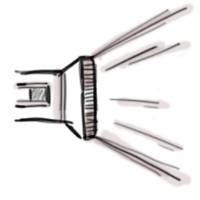The ULISSES project is pleased to present its podcast, a series of interviews with experts in the field of air monitoring in cities.
Episode 1: Air quality monitoring in cities
For our first episode, we welcome Lukas Emmenegger, Head of the Laboratory for Air Pollution / Environmental Technology at Empa, the Swiss Federal Laboratories for Materials Science and Technology to disccuss the needs and existing technologies for air quality monitoring in cities.
Episode 2: 2D material fabrication technology
Our second episode is a discussion about graphene 2D material fabrication technology, a broad topic for which we are welcoming Inge Asselberghs (program manager at IMEC, expert on exploratory 2-D-material-based device fabrication and characterisation), Amaia Zurutuza (scientific director at Graphenea) and Harm Knoops (Atomic scale segment specialist at Oxford Instruments).
Episode 3: 2D material based photodetectors
In our 3rd episode Stephan Suckow (AMO) interviews Cedric Huyghebaert from Black Semiconductor about 2D material fabrication technology. Cedric is a leading expert in nano-applications and materials engineering, a key contributor to the innovation of graphene and graphene-related materials for functional applications.
Episode 4: Mid-IR photonics for environmental sensing
For our last episode Kristinn Gylfason welcomes Delphine Marris-Morini from the University of Paris Saclay and Jana Jágerská from the Artic university of Norway, to discuss Mid-IR photonics for environmental sensing. Prof. D. Marris-Morini is specialised in silicon photonics in the near-IR and mid-IR wavelength range. Dr J. Jágerská is group leader in the field of nanophotonics and laser spectroscopy with a focus on mid-infrared on-chip sensors for trace gas detection.
Efficient time-adaptive Expectation Maximization (EM) algorithm for HMM tracking
In ULISSES we are developing data-driven calibration algorithms for autonomous CO2 sensor calibration. This has been done by developing an approach where a Hidden Markov model (HMM) is used to predict on a calibration coefficient to compensate for remaining dependencies of environmental impacts such as temperature on the sensor measurement output. The HMM model is learned from the past sensor data in an unsupervised way using the expectation maximization algorithm. For such an approach, convergence and sample complexity are critical factors.
Networked data-driven self-calibration routines
In ULISSES we are developing networked data-driven calibration algorithms for autonomous CO2 sensor calibration. In a network each sensor has an own belief on the measurement. Sensors that have been recently calibrated using a reference might have a better calibrated sensor model than other sensors that have not been calibrated for long time and their model has become outdated.
Platinum diselenide (PtSe2): a novel 2D material with very promising properties for applications in electronics and sensing
In ULISSES we are actively researching its use for photodetectors. Its main strength is that, in contrast to many other materials, it can be synthesized at a relatively low temperature compatible to common CMOS processing, without strict substrate requirements...
ULISSES Events

Graphene 2022
The ULISSES partners organized a special session focussed on the application of graphene and 2D materials in integrated optical gas sensors in the European research projects ULISSES and AEOLUS at the Graphene 2022 conference in Aachen in July 2022.
Graphene Week 2022
During Graphene Week 2022 in Munich, AMO GmbH had a booth, where the ULISSES project was the main represented project.
Conference contributions

"Theory and optimization of graphene photothermoelectric detectors"
"Everyone should have access to high-resolution and real-time air-quality data"
"Design and optimization of graphene photothermoelectric detectors"
Scientific
publications
publications

1.
Pierre Edinger et al.
Vacuum-sealed silicon photonic MEMS tunable ring resonator with an independent control over coupling and phase.
Optics Express 31, 6540 (2023). doi: 10.1364/OE.480219. Archive: Infoscience2.
Gaehun Jo, Pierre Edinger, Simon J. Bleiker, Xiaojing Wang, Alain Yuji Takabayashi.
Wafer-level hermetically sealed silicon photonic MEMS by Direct Metal-to_Metal Bonding.
in WaferBond’22 Conference of Wafer Bonding for Microsystems, 3D- and Wafer Level Integration (2022). Archive: DIVAProject publications

Infosheet
A description of the project has been developed and is available for download, as a single page, printer-friendly PDF info sheet.
Webinar

ULISSES final webinar — 31 May 2023
As the ULISSES project is coming to an end, we would like to invite you to our ULISSES final webinar. Members of the ULISSES consortium will present the achievements of the project on 2D material integration with photonics, miniaturized gas sensing, and smart sensor calibration for the IoT. An open discussion with the registered stakeholders will follow.
CO2 sensors in smart phones — 27 January 2021
What if you could have access to real-time air quality monitoring on your smart phone, mapping out where all the pollution hot spots are located? In cities, Air Quality (AQ), can change dramatically from one hour to the next and from one block to another. Everyone should have access to this data, right? We believe so!


